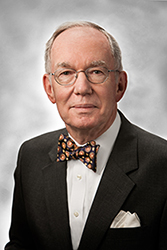Director’s Corner—NCHS and Public Health
Posted on by
Monday, April 7, marks the beginning of National Public Health Week. For the past 20 years, the American Public Health Association has observed National Public Health Week as a time to recognize the contributions of public health and highlight issues that are important to improving our nation’s health. This makes it a good time reflect on our mission of monitoring the nation’s health.
I’d like to say that NCHS plays a central role in America’s public health, but it’s probably more accurate to say that America’s public health is central to who we are and what we do. NCHS’ mission is to provide statistical information that will guide actions and policies to improve the health of the American people. We are a unique public resource for providing unbiased health information—and a critical element of public health and health policy.
For more than 50 years, our programs and surveys have documented and reported on seismic shifts in the nation’s health. We have tracked the slow but steady decline of cigarette smoking following the 1964 Surgeon General’s report, and the rapid drop in children’s lead levels following the removal of lead from gasoline. Today, our programs are woven into the fabric of the communities that promote public health.
Public health is a science-driven discipline. To direct resources appropriately and determine whether programs have an impact, you need good measurement tools. NCHS provides many of those tools, such as our Division of Vital Statistics and its National Vital Statistics System (NVSS). NVSS collects and registers the nation’s births and deaths, and produces key information on teenage births and birth rates, prenatal care, birthweight, infant mortality, and life expectancy.
Our National Health Interview Survey is the nation’s largest in-person household health survey. It provides data on health status, access to and use of health services, health insurance coverage, immunizations, and health-related behaviors. It’s hard to imagine effective public health planning without these critical data.
The National Health and Nutrition Examination Survey (NHANES) takes fully operational mobile medical facilities into communities across the nation to assess the health and nutritional status of Americans. This unique survey combines personal interviews with a thorough physical examination that includes diagnostic procedures and laboratory testing. These give us—and our public health colleagues—a treasure trove of information about whether previously diagnosed conditions, such as hypertension, are under control as well as the levels of undiagnosed conditions.
Our National Health Care Surveys provide data on health care organizations and providers, the services they provide and the patients they serve. The surveys are used to assess our country’s health care delivery system, track the growing use of health information technology, and examine quality and patient safety issues. Emergency care system data show us the nation’s ability to both provide basic emergency care and respond to natural disasters and other public health emergencies.
We have outstanding staff who work in a variety of disciplines to make our data the gold standard for health statistics, and among them I would like to salute the men and women of the U.S. Public Health Service Commissioned Corps. Their dedication to improving public health both here and around the world is unmatched. We are indeed fortunate to have them among our ranks at NCHS.
As proud as we are of our achievements and contributions to America’s public health, we still have a lot to do. We need to be timelier in our reporting, more expansive in our coverage, and, in an age of cyber-attacks and security breaches, even more committed in our resolve to protect the privacy of the thousands of Americans who participate in our surveys and the millions who provide data through our vital statistics system. Protecting our participants is essential to accurately depict the health of all Americans. And that is the real heart of our mission.
Posted on by

